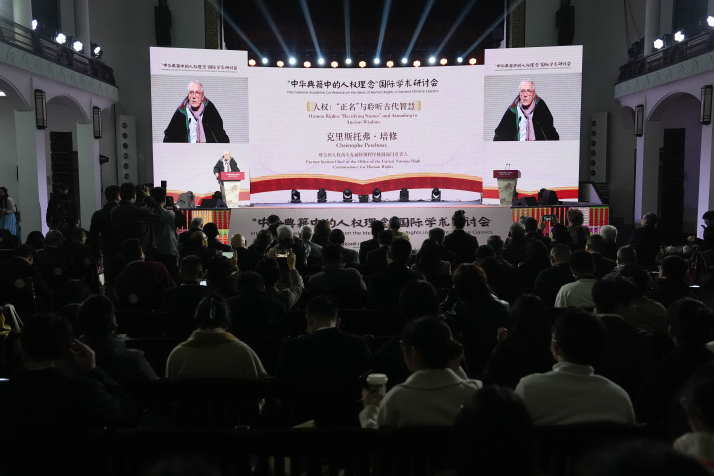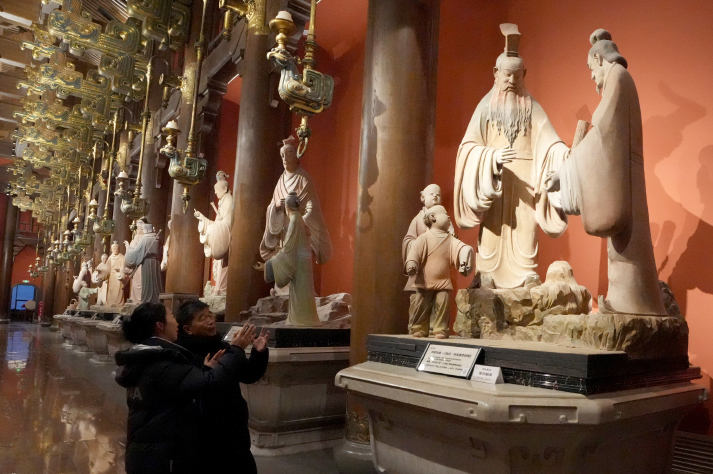
Christophe Peschoux, a former senior officer at the UN Office of the High Commissioner for Human Rights, delivers a keynote speech at the International Academic Conference on the Ideas of Human Rights in Ancient Chinese Classics, in Changsha, Hunan Province, on November 20 (XINHUA)
On December 10, 1948, in the wake of the horrors of World War II, nations around the globe came together to endorse the Universal Declaration of Human Rights (UDHR). This landmark document, adopted without opposition by any member state of the newly established United Nations, outlines a set of fundamental rights meant to apply universally to all people.
The UDHR opens with the powerful declaration: "All human beings are born free and equal in dignity and rights. They are endowed with reason and conscience and should act towards one another in a spirit of brotherhood."
Notably, China's Zhang Pengchun, then also Vice Chairman of the UN Commission on Human Rights, made considerable contributions to this text. He introduced the Chinese term liangxin (conscience) and stressed the idea of brotherhood, inspired by the Confucian concept of ren (benevolence). Zhang envisioned the UDHR as a tool to advance humanity's moral and ethical development.
Ancient Chinese classics abound with ideas that align with modern human rights principles, emphasizing the value of human life, survival, development, happiness, equality, justice and peace. Although the term "human rights" was not explicitly used in ancient Chinese discourse, these concepts reflect its essence, according to Zheng Renzhao, a researcher at the Chinese Academy of Social Sciences' Institute of Ancient History.
Zheng made these remarks during the International Academic Conference on the Ideas of Human Rights in Ancient Chinese Classics. Held in Changsha, Hunan Province, on November 20, the conference was jointly hosted by the China Society for Human Rights Studies, the Publicity Department of the Communist Party of China (CPC) Hunan Provincial Committee and Hunan University. The conference explored questions such as: What human rights ideals can be found in Chinese classics? And why is it important to examine these ideals within the context of Chinese culture?
The conference, attended by over 200 scholars from around the world, sought to address these questions in an attempt to foster dialogue and mutual learning among civilizations.
Revisiting history
Christophe Peschoux, a former senior officer at the UN Office of the High Commissioner for Human Rights, underlined the importance of hosting international conferences on human rights. He said human rights concern everyone and have become a central topic within societies and on the global stage.
Drawing from 40-plus years of experience in humanitarian work, refugee protection and human rights advocacy, Peschoux shared with the audience his conviction that the values underpinning modern human rights norms, as articulated in the UDHR, are present in every society, culture and civilization.
However, he argued that the most effective way for these values to take root in and thrive in China's unique context is not through uncritical adoption from external sources, mechanical transplantation or treating them as dogma.
"It's a superficial approach," he told Beijing Review. "It is important to delve into your own history, cultural heritage, moral and political philosophy and experiences to look for and identify the common sources from which they derive and to connect them to your cultural roots."
He noted with approval that China is revisiting and embracing its opulent cultural and historical traditions, recognizing the value and depth of its 5,000-year-old civilization.
Jiang Jianguo, Executive Vice President of the China Society for Human Rights Studies, highlighted the importance of establishing a more independent human rights discourse in China. He pointed out that the country's current understanding of human rights remains heavily influenced by Western academic frameworks and ideas.
Despite China's substantial advancements and rapid development in the field of human rights, Jiang emphasized that certain Western powers have deliberately politicized the concept of human rights. This politicization is often wielded as a tool to interfere in the internal affairs of other nations to uphold global hegemony.
Jiang stressed the necessity of thoroughly researching and articulating China's unique human rights concepts. This involves a comprehensive approach to explain the nation's cultural foundations, practical achievements, global contributions and development trajectory, in order to build a human rights discourse that reflects China's own perspective.
Peschoux added that understanding China's human rights record requires a context-sensitive approach. He criticized Western narratives for frequently portraying China in a negative light and argued that progress in human rights should be evaluated within the context of each country's historical and societal evolution.
"China is following its own path and its own revolutions," Peschoux stated. "Human rights conditions should not be compared across countries. Instead, a country's progress should be assessed by measuring its current human rights situation against its past."
He underscored China's accomplishments over the past 40 years, having lifted nearly 800 million people out of extreme poverty as of late 2020, accounting for more than 75 percent of global poverty reduction during the same period. "This is extraordinary and unprecedented achievement," Peschoux remarked. "The right to food, water, shelter—all these fundamental rights we have been talking about have been realized in China."
Explain to the world
Professor Deng Wei, Secretary of the CPC Hunan University Committee, highlighted the profound philosophy, ethics, morality and political wisdom embedded in Chinese classics.
He listed key principles from ancient thinkers, noting that the ancient sage Confucius (551-479 B.C.) introduced the concept of "the benevolent love of others," while the Confucian philosopher Mencius (372-289 B.C.) advocated that "the people are the most important element in a state, followed by the spirits of land and grain, with the ruler being the least important."

Visitors take photos of sculptures at the Nishan Sacred Land, a cultural experience base where people can learn about Chinese culture and Confucianism in Qufu, Shandong Province, on December 13 (XINHUA)
These concepts reflect respect for human dignity and livelihood, aligning closely with modern human rights ideals, Deng explained.
Giuseppina Merchionne, a professor of Chinese language and culture at the University of Milan, Italy, praised Confucius as embodying the essence of Chinese culture and philosophy. "Confucius taught that we should use culture to achieve peace, not war," Merchionne said.
She called on Italy and China—both nations with abundant cultural heritage—to make greater contributions to global peace and the advancement of human rights.
Swiss Sinologist and historian Peter Hediger observed that ancient Chinese schools of thought, including Confucianism and Taoism, prioritized the societal harmony and wellbeing, despite their differing governance philosophies. In the context of a hierarchical feudal society, both traditions emphasized the importance of protecting and caring for the people.
Hediger also identified two core principles of good governance and the protection of human rights in ancient Chinese thought. First, individual self-improvement was considered a prerequisite for societal order. Second, prosperity for all, especially for the grassroots population, was seen as essential.
"China's experience in dealing with the delicate balance between state power and individual rights may be more historic, profound and sustainable than that of any other country," he asserted.
"Facts have proved that rather than blindly following the Western-style route, China has found an effective way," Hediger concluded.


